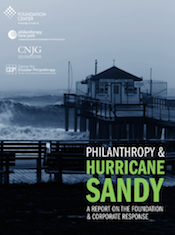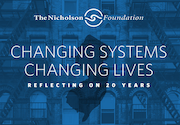Site Search
- resource provided by the Forum Network Knowledgebase.
Search Tip: Search with " " to find exact matches.
Sample disaster preparedness and recovery plans for foundations.
This advocacy and civic engagement toolkit is designed for private foundations that want to educate and encourage their grantees about getting involved in civic and policy activities to increase organizational capacity and impact. While its primary focus is on the grantmaking activity of foundations, the toolkit also addresses rules and guidance for policy involvement by foundation officials acting on behalf of their foundations.
A sample conflict of interest form for independent private foundations.
CNJG Member survey ranking which issues are most important to them.
Nonprofit Finance Fund's Annual Survey chronicles the challenges facing the nonprofit sector and calls out some of the targeted investments we can start to agree on as a society to salvage the investment we have collectively made in our social infrastructure. We believe that a coordinated intervention now will not only better prepare us for inevitable future economic crises; it can lead to a happier, healthier community for us all.
Adopted by CNJG”s Board of Trustees in October 2023, these eight Principles offer philanthropy a source of direction for their own equity journey. Each principle begins with a common understanding followed by developmental steps, and the aspiration for each principle. These principles are intended to promote continuous learning, vulnerability, and reflection for how philanthropy can evolve from its historical roots to a more trusting, accountable, and equitable model.
As a follow-up to our Giving in Indiana study (released earlier this year), Indiana Philanthropy Alliance is pleased to share this snapshot of promising practices for advancing diversity, equity and inclusion in Indiana philanthropy. Throughout our state, foundations are incorporating the values of diversity, equity and inclusion (DEI) into their organizational cultures; engaging diverse populations as staff, board members, donors, and grantees; and working to make their communities more welcoming places. This report is an effort to capture a sampling of these endeavors.
When considering how to improve health outcomes for low-income individuals, most people think about providing access to good medical care and keeping the cost of that care as low as possible. What people rarely think about is the connection between good health and quality affordable housing.


For 20 years, The Nicholson Foundation worked to advance meaningful change in safety net service systems in New Jersey. Its grantmaking journey is described in Changing Systems, Changing Lives: Reflecting on 20 Years. Through stories and related text, the book showed how a small family foundation could take six guiding themes and put them into action through grants and partner support. In the process, the Foundation collaborated to spur real systems change that benefitted individuals, families, and communities. A recent scholarly paper built on that work, helping to make the Foundation’s approach broadly accessible to researchers, academics, and philanthropists. “A Framework for Creating Systems Change,” by Drs. William Brown and Wynn Rosser published in The Foundation Review, presents a new model for systems change. Five of the model’s seven components reflect themes in Changing Systems, Changing Lives. The sixth component slightly shifts the emphasis of the Foundation’s “Engaging with Government” theme, and the seventh highlights the Foundation’s overall approach by including performance measurement as a distinct and separate component of the model.
Download or order a free hard copy of The Nicholson Foundation book, "Changing Systems, Changing Lives"
Read Brown W, Rosser W. "A Framework for Creating Systems Change". The Foundation Review, 2023;15(4):50-6.
Join us for an informative session with Justin Scheid, New Jersey Field Office Director at the US Department of Housing and Urban Development. The Field Office manages a range of important programs and special initiatives, including Opportunity Zones, EnVision Centers, Section 3 economic opportunities, Promise Zones, ConnectHome, and homelessness.
During this discussion, Justin Scheid will share updates on CARES Act Funding and other HUD related programs and resources critical to COVID recovery and relief. We’ll also discuss strategies for philanthropy to partner with HUD to leverage resources and maximize impact in local communities.
Cost: Free for CNJG Members. $50 for Non Member Grantmakers
Webinar Video
